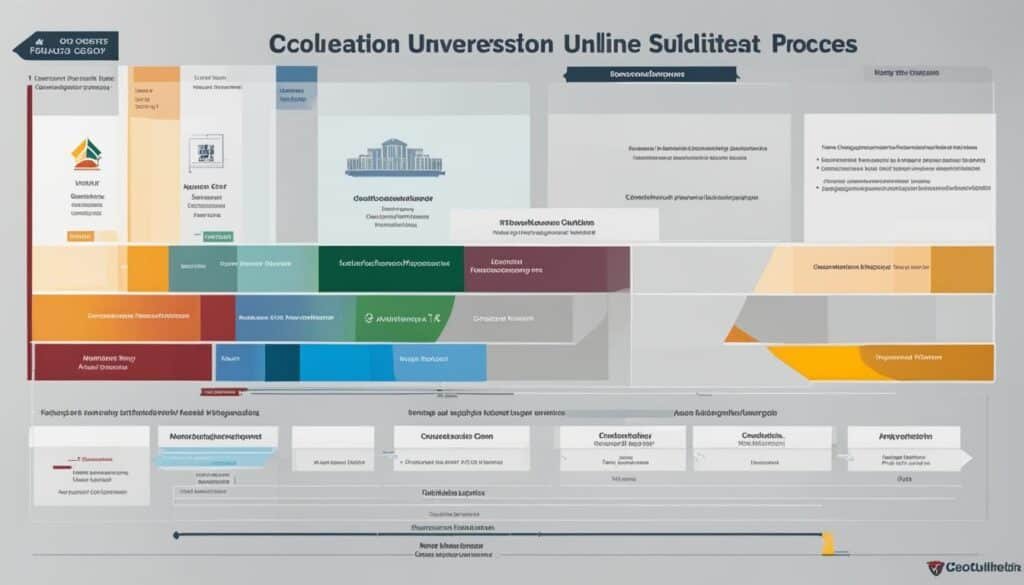Online University Degree : Enroll in flexible online degree programs offered by accredited universities like National University and Grand Canyon University, making higher education accessible for all. Designed for busy adults, these institutionally accredited courses allow online students to earn their degrees without sacrificing their work and family life, all in the comfort of their own space.
Also Read: Study At California University Of Science And Medicine Today!
Key Takeaways:
- Flexible and accessible university education
- Online degree programs through accredited institutions
- Balancing work, family, and studies with ease
- Opportunities for personal and professional growth
- A strong foundation towards future success
The Evolution of Online University Education
The landscape of online university education has evolved significantly over the years. In Fall 2021, approximately 30% of U.S. college students were enrolled in exclusively online classes. Institutions like National University and Grand Canyon University offer a broad selection of accredited online courses, catering to the diverse needs of modern learners.
These programs enable students to engage in a quality education through online platforms equipped with technology designed to create dynamic and interactive learning experiences. Whether due to geographical constraints, the need for a flexible schedule, or a preference for online learning, online university education has expanded to accommodate different student needs.
Also Read: Is A Grand Canyon University Degree Worthless? Exploring Facts
Online university education has come a long way, now providing the same quality education as traditional campus programs, but with increased flexibility and access.
With the evolution of online university education, distance education participation has seen tremendous growth, attracting students from various locations, backgrounds, and schedules. Some contributing factors include:
- Advancements in technology and the rise of high-speed internet access
- Increased offerings of online degree programs at all levels, from associate to doctoral
- Greater acceptance and validity of online degrees by employers
As a result, pursuing accredited online college degrees has become a popular choice for many looking to further their education and advance their careers.
| Year | Percentage of Students Enrolled in Exclusively Online Classes |
|---|---|
| 2010 | 9.4% |
| 2015 | 14.7% |
| 2021 | 30% |
In conclusion, the evolution of online university education has led to a significant shift in the way students experience higher education. It offers greater flexibility and accessibility, providing learners the opportunity to achieve their academic goals while balancing life’s other commitments.
Also Read: Exploring The University Of Utah PA Program: Details & Overview
Key Benefits of Pursuing Accredited Online Degree Programs

As technology continues to advance and higher education institutions adapt to the digital age, accredited online degree programs have become an increasingly popular choice for students. These programs offer numerous advantages, ranging from flexibility to cost savings to a wider selection of degree options.
Flexibility to Balance Work, Family, and Studies
Online education programs provide the flexibility to balance a variety of responsibilities, including work and family life. This flexibility allows students to engage with the coursework and study materials on their own time, making it easier to fit pursuing a degree into their busy schedules. The ability to learn at one’s own pace offers an opportunity for students to excel academically and achieve their goals.
Cost Savings: No Commute and Lower Tuition Fees
Students pursuing online education degrees can benefit from significant cost savings compared to traditional on-campus programs. There is no need to commute to a physical location, which reduces transportation costs and time. Additionally, online programs often have lower tuition fees, as institutions can reduce overhead expenses related to maintaining a physical campus.
Also Read: Brenau University PA Program: Unlocking Medical Careers
| Expense | Traditional On-Campus Program | Online Degree Program |
|---|---|---|
| Tuition Fees | Higher | Lower |
| Transportation/Commuting Costs | Higher | Lower/None |
| Room and Board | Higher | Lower/None (study from home) |
| Time Investment in Commute/Attending Classes | Higher | Lower/None |
A Wide Selection of Online Degree Options
Online degree programs offer a vast array of choices for students in a variety of disciplines. From business and healthcare to engineering and the arts, online students have access to an extensive range of online degree options, allowing them to find the perfect fit for their career goals and personal interests. This wide selection caters to the diverse needs of students and ensures that they can find a program that aligns with their desired educational path.
Comparing Online Bachelor’s, Master’s, and Doctoral Programs

Accredited institutions like National University provide a diverse range of degree programs at multiple levels, offering online bachelor’s degree, online master’s degree, and online doctoral degree options. The flexibility and convenience of these online degree courses are designed to cater to the needs of a variety of students, whether they’re just starting their higher education journey or looking to advance in their professional careers. In this section, we’ll explore the unique features and benefits of each degree level, providing a comprehensive comparison to guide your decision-making process.
Also Read: Discovering Education Free In USA: An Unveiled Opportunity
To better understand the differences between online degree programs, let’s examine some factors to consider when choosing between a bachelor’s, master’s, or doctoral degree.
| Degree Level | Duration | Course Load | Career Opportunities |
|---|---|---|---|
| Online Bachelor’s Degree | 3-4 Years | Full-time or Part-time | Entry- to Mid-Level positions in various industries |
| Online Master’s Degree | 1-2 Years | Full-time or Part-time | Mid- to Senior-Level positions, specialization, and increased earning potential |
| Online Doctoral Degree | 3-7 Years | Usually Part-time | Senior- and Executive-Level positions, academia, and research |
Note: The duration and course load for each degree level may vary depending on the institution and program. These are general guidelines to provide an overview of what to expect.
“Online learning has revolutionized higher education, making it possible for students to earn a bachelor’s, master’s, or doctoral degree from anywhere in the world.”
Regardless of the degree level, online programs typically share some common features:
- Interactive and dynamic learning environments
- Flexible scheduling to accommodate work and personal commitments
- Opportunities to network and collaborate with peers from diverse backgrounds
- Access to the same quality coursework and resources as traditional, on-campus programs
By offering online bachelor’s, master’s, and doctoral degrees, accredited institutions such as National University allow students to tailor their education to their specific needs and goals. Pursuing these online degree courses not only opens up new opportunities for personal and professional growth, but enhances one’s earning potential and expertise in their chosen field.
Discovering the Best Online Degrees for Your Career Path

Choosing the best online degrees is essential for maximizing your potential in today’s competitive job market. Various accredited online college programs offer a myriad of options, catering to diverse career paths and interests. Depending on your aspirations, you can explore popular fields like business administration, healthcare and nursing, or information technology and cybersecurity – all available through fully-accredited online degree programs.
Business Administration and Management
Online degrees in business administration and management are highly sought after by professionals and entrepreneurs alike. These programs typically cover essential topics such as finance, marketing, organizational behavior, and strategic management. An online degree in business administration can open doors to various career opportunities, including management and executive roles in global corporations, non-profit organizations, and even government agencies.
Healthcare and Nursing Degrees for Future Medical Leaders
Online degrees in healthcare and nursing cater to aspiring medical professionals, preparing them to become future leaders in the dynamically evolving healthcare industry. Examples of popular online healthcare and nursing degree programs include:
- Bachelor of Science in Nursing (BSN)
- Master of Science in Nursing (MSN)
- Doctor of Nursing Practice (DNP)
- Master of Healthcare Administration (MHA)
Graduates of these online programs can pursue successful careers in various healthcare settings, including hospitals, rehabilitation centers, community health organizations, and private practices. Online degrees in healthcare and nursing also support continued professional growth through specialization and advanced practice nursing roles.
Information Technology and Cybersecurity: The Digital Future
The fast-growing field of information technology and cybersecurity offers a plethora of online degree options, equipping students with the necessary skills to navigate and protect the digital world. These programs typically cover areas like network administration, software development, information systems management, and cybersecurity. With the increasing demand for skilled IT professionals and cybersecurity experts, this career path offers immense opportunities for personal and professional growth.
In conclusion, investing in the best online degrees tailored to your career path is a smart choice for personal and professional development. Whether you aim to pursue a career in business administration, healthcare and nursing, or information technology and cybersecurity, accredited online degree programs empower you to achieve your goals while balancing work, family, and other commitments.
Understanding the Accreditation of Online Universities

Accreditation serves as a benchmark for the quality of education provided by online universities. Both National University and Grand Canyon University possess accreditation by respected accrediting bodies – WASC Senior College and University Commission and the Higher Learning Commission. This accreditation ensures that the institutions maintain high academic standards for their online and traditional courses, creating a foundational trust in the quality of education offered.
When evaluating the legitimacy of an online university, it is essential to understand the difference between the two primary types of accreditation: regional and national. The majority of non-profit, degree-granting institutions in the United States are regionally accredited. The following table provides an overview of the regional accreditation agencies:
| Regional Accrediting Agency | Region |
|---|---|
| Higher Learning Commission (HLC) | North Central |
| WASC Senior College and University Commission (WSCUC) | Western |
| New England Commission of Higher Education (NECHE) | New England |
| Northwest Commission on Colleges and Universities (NWCCU) | Northwest |
| Southern Association of Colleges and Schools Commission on Colleges (SACSCOC) | Southern |
| Middle States Commission on Higher Education (MSCHE) | Middle States |
Typically, regionally accredited institutions only accept transfer credits and degrees from other regionally accredited schools. This is an important consideration for prospective students who plan to transfer, as well as those who plan to pursue advanced degrees. National accreditation, on the other hand, primarily addresses the accreditation of specialized institutions, such as vocational and trade schools.
“Ensuring that an online university is accredited by a recognized agency is critical in determining the quality and value of the education that the institution provides.”
With a clear understanding of the accreditation process for online universities, students can confidently pursue accredited online degrees from reputable institutions. This helps ensure that the time and effort invested in online education results in a degree with credibility and recognition, paving the way for a successful career.
Exploring Affordable Online Degree Programs and Financial Aid
One major advantage of pursuing an online education is the potential for financial savings. Affordable online degree programs accessible to a wider range of students due to lower tuition fees and the ability to save on costs associated with attending on-campus classes, such as transportation and housing.
Additionally, financial aid is available to help support online college students in their academic pursuits. There are numerous scholarships and grants specifically designed for online learners, making higher education more accessible and attainable for students who may not have considered pursuing a degree due to financial constraints.
How to Find Scholarships and Grants for Online Students
Finding scholarships and grants suitable for online college students can be a daunting task, but there are various resources to assist in the search and application process.
- Begin by researching individual institutions, as many colleges and universities offer scholarships for online college students.
- Explore professional organizations and foundations that offer funding for students pursuing a specific field or degree.
- Search for federal and state financial aid programs, such as the Federal Pell Grant, that cater to students attending accredited colleges and universities.
It is crucial to research scholarships and financial aid programs thoroughly, paying close attention to eligibility requirements, application deadlines, and the amount of aid provided. This ensures that you maximize your chances of receiving financial support during your online college journey.
“I’m so grateful for the scholarships available for online students. They have allowed me to continue my education without the financial burden that comes with traditional on-campus programs.”
By exploring affordable online degree programs and financial aid opportunities, students can obtain an education while saving money and avoiding significant student loan debt. Online education not only provides flexibility and convenience but allows for students from diverse financial backgrounds to pursue their academic and career goals.
The Convenience of Online Learning: Anytime, Anywhere Education

Online learning offers the incredible convenience of pursuing education on the learner’s terms, allowing them to access their coursework and materials from any location and at any time. This flexibility has proven particularly beneficial for individuals with varied schedules or responsibilities, including full-time employees, military personnel, and parents who require an alternative to traditional classroom settings.
Short terms enable year-round course registration, allowing students to learn at a pace that suits their individual needs.
With structured coursework – such as discussion posts, academic papers, and other assignments – students can effectively manage their online learning experience around their existing commitments. Furthermore, the convenience of anytime, anywhere education supports year-round course registration through short terms, empowering learners to progress at their own pace.
Beyond the flexibility of accessing online classes whenever and wherever possible, students also benefit from digital tools and resources that enhance the overall online learning experience. Examples of such tools include:
- Interactive multimedia content, such as videos and animations
- Virtual labs and simulations for hands-on learning
- Online discussion forums and live chat for collaboration and peer interaction
- Webinars and virtual office hours with instructors
The convenience of online learning makes education more accessible and manageable than ever, catering to the unique needs of diverse students – regardless of their location or schedule. This innovative evolution of educational delivery has opened new doors for those seeking to enrich their knowledge base and open up new career opportunities in an increasingly digital world.
Choosing an Online College: What to Look For in a Quality Program

When choosing an online college, it is crucial to consider several factors that contribute to a quality program. These factors include the institution’s reputation, student reviews, degree levels offered, and interactive learning tools. By examining each aspect, prospective students can ensure they are enrolling in a reputable online program that provides a comprehensive and engaging learning experience.
Reputation and Student Reviews: Hearing from Alumni
A college’s reputation and the feedback from its students and alumni play a significant role in identifying a quality online program. Look for institutions offering online bachelor’s degree, online master’s degree, and online doctoral degree programs with a proven track record of academic excellence and positive student outcomes. Additionally, don’t forget to examine feedback from alumni to gain insights into their experiences and the value of the degrees they have obtained.
“My online master’s degree from ABC University provided me with the knowledge and skills needed to advance my career. The interactive learning tools and networking opportunities exceeded my expectations and left me feeling well-prepared for the job market.”
When researching an online college, prioritize institutions with:
- Strong academic reputation
- Accreditations from recognized organizations
- Positive student and alumni reviews
- Diverse degree program offerings
| Important Details | Examples |
|---|---|
| Academic Reputation | National University, Grand Canyon University |
| Accrediting Organizations | WASC Senior College and University Commission, Higher Learning Commission |
| Key Factors in Alumni Reviews | Overall experience, quality of instructors, course content, career advancement |
Furthermore, take note of the interactive learning tools offered by the online college, as these resources significantly impact the overall educational experience. Look for tools that promote engaging course content, foster peer-to-peer interaction, and facilitate communication with instructors, such as discussion boards, video conferencing, and collaborative workspaces.
By thoroughly researching and considering these factors, you will be better equipped to choose the right online college to pursue your academic goals and achieve professional success.
Online Degree Courses vs. On-Campus: The Shift in Learning Environments

Over the past few years, there has been a significant shift in learning environments as more students opt for online degree courses over traditional on-campus programs. The benefits of online programs, such as flexibility, accessibility, and technology use, have contributed to this shift, especially among students who are also working professionals, live in remote areas, or have other commitments that make attending on-campus classes challenging.
The rising popularity of online college degree programs has led to an increasing number of undergraduate and graduate courses available online. This expansion offers students the option to complete the same quality of coursework online that on-campus students receive, which is a vital aspect of this educational transition.
Flexible Coursework
One of the primary reasons behind the shift towards online degree courses is the flexibility that these programs provide. Online learning allows students to work through the coursework at their own pace, accommodating the needs of those with full-time jobs, family responsibilities, and other time commitments.
“The flexibility of online learning has allowed me to balance my career, family, and education without having to sacrifice any aspect of my life.”
Expanding Access to Education
Online college degree programs have managed to bridge the gap between students and academic institutions, enabling those who live in remote areas or have limited mobility to access quality education. The convenience of online learning has made it possible for these students to pursue higher education without the need to relocate or commute.
- Accessibility for remote learners
- Opportunities for working professionals
- Flexibility for parents and caregivers
| Online Degree Courses | On-Campus Degree Courses |
|---|---|
| Flexible learning schedules | Fixed class schedules |
| Accessible from anywhere | Requires on-site attendance |
| Technology-enhanced learning experiences | Traditional classroom settings |
| Wide range of undergraduate and graduate programs | Program availability may be limited |
In conclusion, the shift towards online degree courses from on-campus programs is a result of the numerous benefits they provide, such as flexible schedules, accessibility, and technology-enhanced learning experiences. As the demand for higher education continues to grow, online college degree programs are expected to become an increasingly popular choice among students, regardless of their geographical location or personal circumstances.
Advancing Your Career with an Online University Education
An online university education provides an excellent opportunity for individuals looking to advance their careers and acquire real-world skills. In today’s fast-paced and competitive job market, obtaining a degree from a reputable online institution can help you grow professionally, enhance leadership skills, and gain an edge over your peers.
Real-World Skills and Networking Opportunities Online
By choosing an online learning platform, you gain access to a wide range of courses and degree programs that focus on teaching practical, real-world skills. These skills are designed to make you more marketable and enhance your current knowledge, increasing your chances of success in your chosen career path.
Online university education allows you to merge learning with practical experience, creating a balance between theory and application.
Another critical aspect of online learning is the opportunity to network with other professionals. Through discussion boards, group projects, and virtual events, students can interact with their peers and instructors, learn from their experiences, and expand their professional networks.
Here are some of the key benefits of choosing an online university education to advance your career:
- Learn from experienced instructors with industry expertise.
- Develop essential soft skills, such as time management, communication, and problem-solving.
- Access to job resources and career services, including resume assistance, interview coaching, and job placement assistance.
- Build a strong professional network through collaboration and interaction with diverse classmates.
- Flexibility to balance your work, family, and education commitments.
In conclusion, an online university education offers numerous advantages to help you advance your career and increase your professional value. By investing in your education and acquiring real-world skills, you are taking a significant step toward achieving your personal and professional goals.
Enrollment Process: Starting Your Journey in Online Education
The enrollment process for an online degree program is streamlined to accommodate students’ varied schedules and commitments. Institutions such as National University accept and review applications year-round, offering monthly start dates and flexible course formats like four-week classes. This approach signifies how online education caters to the diverse start points of students’ journeys, emphasizing convenience and user-friendly enrollment procedures.
When you decide to begin your online learning journey, the first step is to research and select the online degree program that aligns with your career goals and personal interests. Many institutions offer a wide variety of online classes across multiple disciplines, making it easier for you to find the perfect fit.
Once you have chosen your desired online degree program, the next step is to gather all the necessary documentation required for your application. This typically includes:
- High school transcripts or diploma
- Collegiate transcripts (if applicable)
- Proof of English language proficiency (for non-native speakers)
- Letters of recommendation
- Personal statement or essay
- Resume or CV (for some graduate programs)
It is essential to double-check the specific requirements of your chosen institution before submitting your application. Some institutions may require additional documentation or have unique prerequisites for particular programs.
Starting your journey in online education is an exciting and life-changing decision. By following the enrollment process and being well-prepared, you can ensure a smooth transition into your online degree program.
| Step | Action |
|---|---|
| 1 | Research and select your desired online degree program |
| 2 | Gather necessary documentation for your application |
| 3 | Submit your application to the institution |
| 4 | Wait for an admission decision |
| 5 | Prepare for your online classes and begin your journey in online education |
In conclusion, the enrollment process for online education aims to be accessible, user-friendly, and accommodating for students from all walks of life. With year-round application opportunities, monthly start dates, and flexible class formats, online degree programs make it possible to start your educational journey whenever you’re ready.
Conclusion
In our concluding thoughts, obtaining an online university degree has become an increasingly viable investment in education as it offers flexibility, accessibility, and a student-centered online experience. This pathway to higher education caters to the diverse needs of modern learners and ensures quality and credibility with accredited online university programs.
As online education provides lifelong learning opportunities for individuals, it plays a critical role in preparing students for future success in their chosen fields. The cost savings, diverse range of degree options, and the chance for career advancement make online learning a valuable choice for those who are ready to enhance their skills and achieve their academic and professional goals.
With the continued growth and evolution of online education, more students are exploring and enjoying the benefits of these programs. Through the convenience, support, and tailored learning experiences provided by online colleges, individuals can fully realize their potential and equip themselves for success in an ever-evolving professional landscape.
Also Refer : Study At California University Of Science And Medicine Today!
FAQs
Q: What are the benefits of pursuing an online university degree?
A: Some key benefits of pursuing an online university degree include flexibility in balancing work, family, and studies; cost savings through reduced tuition fees and no commuting; and a wide selection of online degree options across various fields.
Q: How can I ensure my online university degree is from an accredited institution?
A: To ensure your online university degree is from an accredited institution, verify that the university is recognized by a respected accrediting body such as the WASC Senior College and University Commission or the Higher Learning Commission.
Q: What types of online degrees are available?
A: Most online universities offer a diverse range of degree programs, including online associate, bachelor’s, master’s, doctoral, certificate, and credential programs across various fields such as business, healthcare, engineering, and arts.
Q: Are online degrees as valuable as on-campus degrees?
A: Yes, online degrees from accredited institutions are recognized and respected by employers, offering the same high quality of education as their on-campus counterparts. Students are able to complete the same coursework online that on-campus students do.
Q: How do online classes work?
A: Online classes are typically structured with discussion posts, academic papers, and other assignments that students can manage effectively according to their schedules. Students can access course materials and interactive learning tools in the online platform at any time and from any location, allowing for a convenient and flexible learning experience.
Q: How can I find financial aid for my online education?
A: To find financial aid options for your online education, research scholarships and grants available specifically for online students. Look for opportunities through the university’s financial aid office, federal student aid programs, and other online resources dedicated to assisting students with funding their education.
Q: Is the enrollment process for online degree programs user-friendly?
A: Yes, the enrollment process for online degree programs is typically streamlined and user-friendly, accommodating students’ varied schedules and commitments. Institutions such as National University accept and review applications year-round, offering monthly start dates and flexible course formats like four-week classes.
Q: What is an online college degree?
A: An online college degree is a program of study offered by a college or university that can be completed entirely online, without the need to physically attend classes on campus.
Q: What are the benefits of earning an online college degree?
A: Earning an online college degree offers flexibility, accessibility, and the opportunity to balance education with other responsibilities such as work or family commitments.
Q: How can I find the best online college for my degree?
A: Researching accredited institutions, considering program flexibility, and evaluating support services are key factors in finding the best online college for your degree.
Q: Are there specific start dates for online college degree programs?
A: Online college degree programs often offer multiple start dates throughout the year to provide flexibility for students to begin their studies at a time that suits them best.
Q: Is financial aid or scholarships available for online college degree programs?
A: Many online colleges and universities offer financial aid and scholarships to help students offset the cost of their education. It’s advisable to explore these options with the institution you are considering.
Q: Do online college degree programs typically require work experience?
A: While some online degree programs may require work experience, many do not. It’s essential to review the admission requirements for the specific program of interest to clarify any prerequisites.
Q: Can I earn the same degree online as on-campus students?
A: Yes, online students can earn the same degree as on-campus students, as long as the online program is offered by an accredited and reputable institution.
Q: What are the typical durations of online college degree programs?
A: The duration of online college degree programs varies depending on the specific degree and program. It’s recommended to review the program details for estimated completion times.
Q: What are the most common online programs offered by universities?
A: Online universities offer a wide range of programs, including undergraduate degrees, certificate programs, and specific degree tracks in various fields such as business, healthcare, and technology.
Q: Are online college courses typically more affordable than traditional on-campus courses?
A: Online college courses can often be more affordable due to factors such as lower overhead costs for the institution and the flexibility for students to continue working while pursuing their degree.




